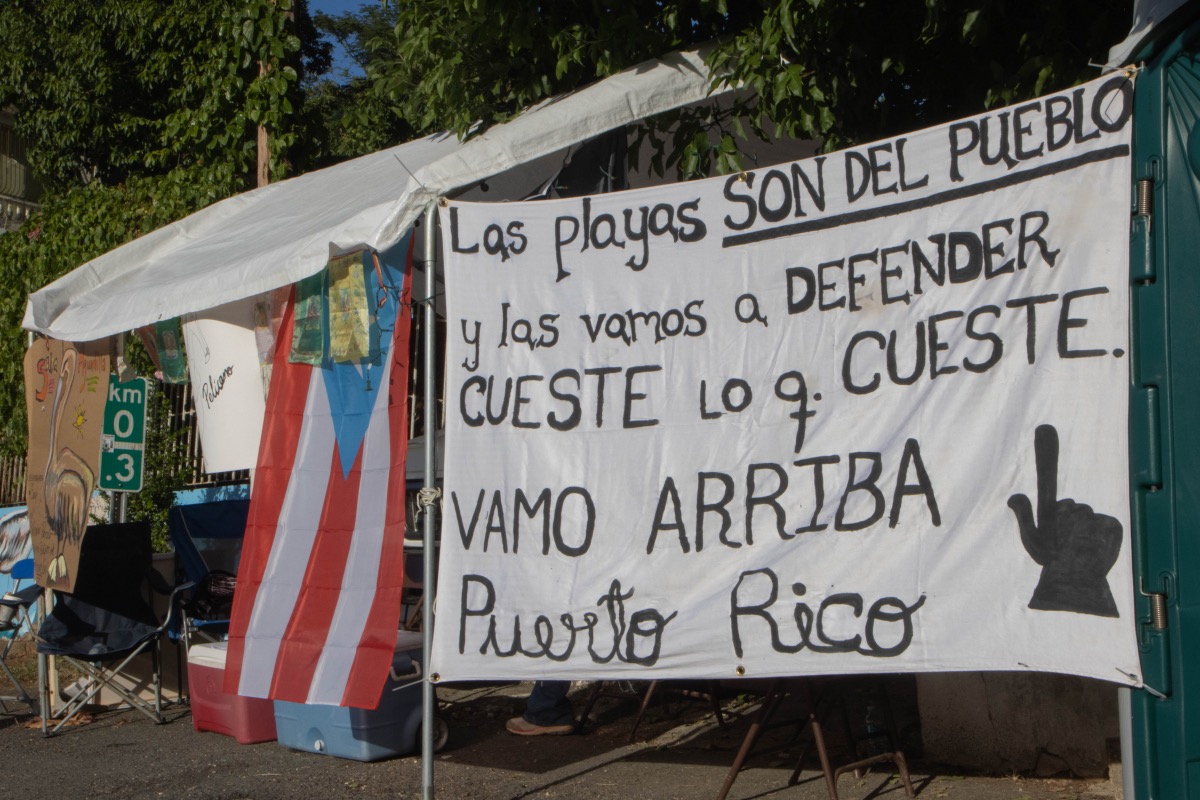

Carlos Edill Berríos Polanco/Latino Rebels
SAN JUAN — On Wednesday, Puerto Rico’s Department of Natural and Environmental Resources (DRNA) ordered a developer that built illegally built on top of Cueva Las Golondrinas in Aguadilla must restore the area impacted by the construction.
The DRNA released documents notifying Aguadilla Pier Corporation that it had 30 days to present a plan to restore the areas of Cueva Las Golondrinas damaged by its illegal construction of a horse paddock and an activities center.
Community groups had filed an injunction against developers to stop the destruction of natural resources.
The DRNA order is particularly important because the natural habitat on top of the cave would not be able to return to its original state had the construction been allowed to remain, explained ecologist Dr. Ariel E. Lugo during a press conference where community group Salva Aguadilla announced it had filed an injunction against developers.
“It’s urgent because that part was the most criminal on top of the cave,” psychologist Dr. Jaris Delgado, a member of Salva Aguadilla and the environmentalist camp Campamento Pelicano, told Latino Rebels.
Activists had been protesting the illegal construction and destruction of the area’s natural resources since 2018. They established an occupied protest outside the main gates of the construction site early in January 2023, after the DRNA failed to keep Aguadilla Pier Corporation and The Cliff Corporation from destroying the area.
Protests came to a head when an activist was shot in the leg by security personnel hired by Aguadilla Pier Corporation. Shortly after the incident, a court in Aguadilla ordered the demolition of the two illegal structures on top of Cueva Las Golondrinas after ruling an initial lawsuit filed by the municipality of Aguadilla had merit.
Owned by wealthy developer Carlos Román González, Aguadilla Pier Corporation complied with the order and began construction. While the demolition of the structures had begun, the company asked for an extension because they could not complete the demolition in the required time.
Meanwhile, The Cliff, also owned by Román González, has continued building 80 villas on land behind Cueva Las Golondrinas, flattening the once-dense forest that populated the area. In 2022, the U.S. Environmental Protection Agency found The Cliff and Grupo Caribe, LLC were in violation of the Clean Water Act and ordered the companies to halt discharges into the sea, but there was little follow-up by the federal organization.
“The developer carried out movement and removal of the earth’s crust and destroyed a habitat of high ecological value and the mogote, without evaluation, without respect for the wildlife law or the instructions of the agencies,” explained biologist José Chabert.
Salva Aguadilla, which filed its injunction on February 28, is attempting to stop The Cliff’s construction, revoke the permits the organization claims were falsely acquired, establish a natural reserve in the area, and reforest the damaged areas. The group claims the permits acquired by The Cliff should be made null and void, then immediately revoked.
“The construction permit was granted by (the Permit Management Office) despite not complying with the requirements established by different government entities. The correct environmental document required for a project with these characteristics is an Environmental Impact Statement, which in turn will require consultation with the federal government entities concerned,” said engineer Nelson Mattei.
While activists see the DRNA’s order as a step in the right direction, they fear the agency will not force Aguadilla Pier Corporation to comply with the reforestation it is legally required to do in the area.
***
Carlos Edill Berríos Polanco is the Caribbean correspondent for Latino Rebels, based in San Juan, Puerto Rico. Twitter: @Vaquero2XL


